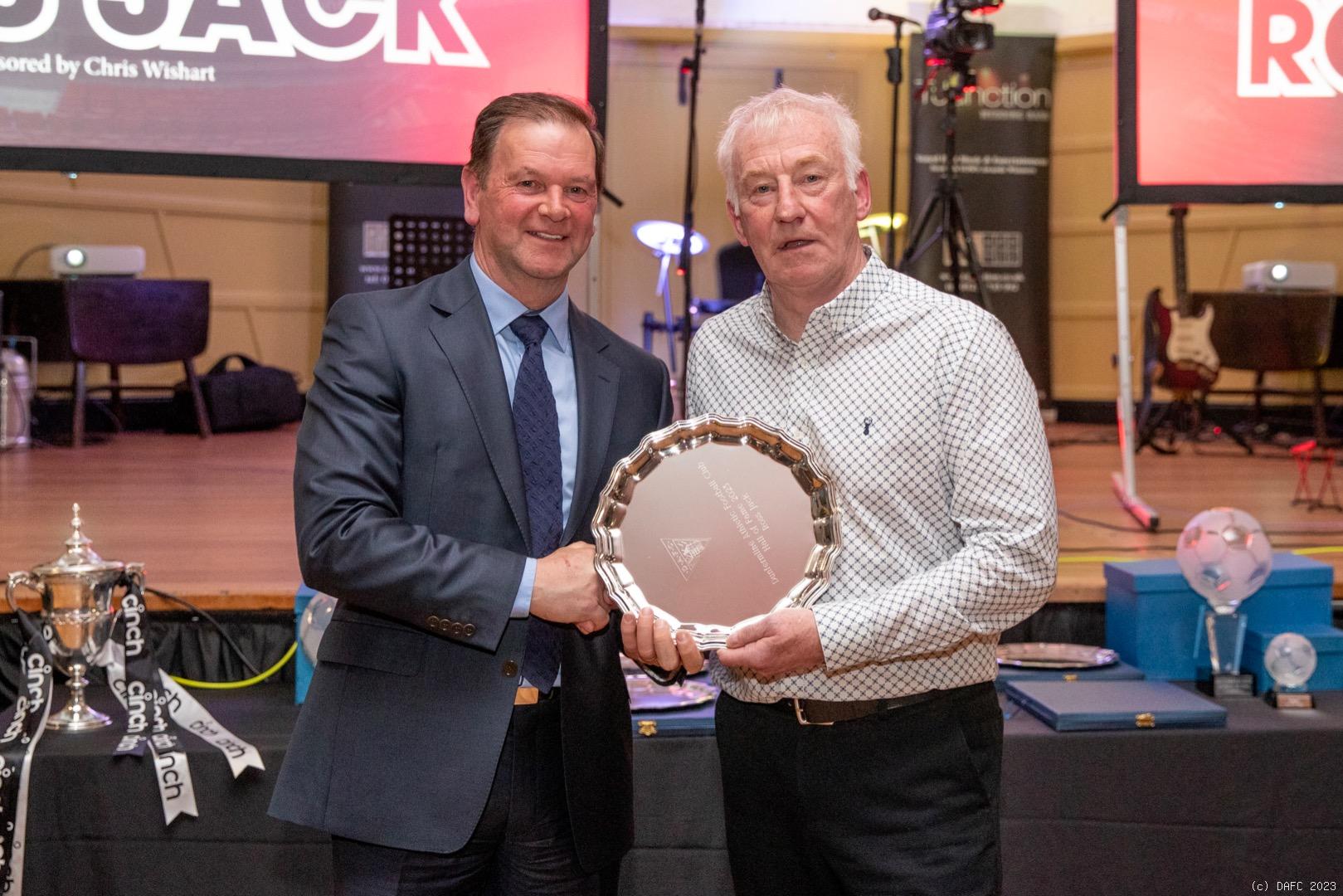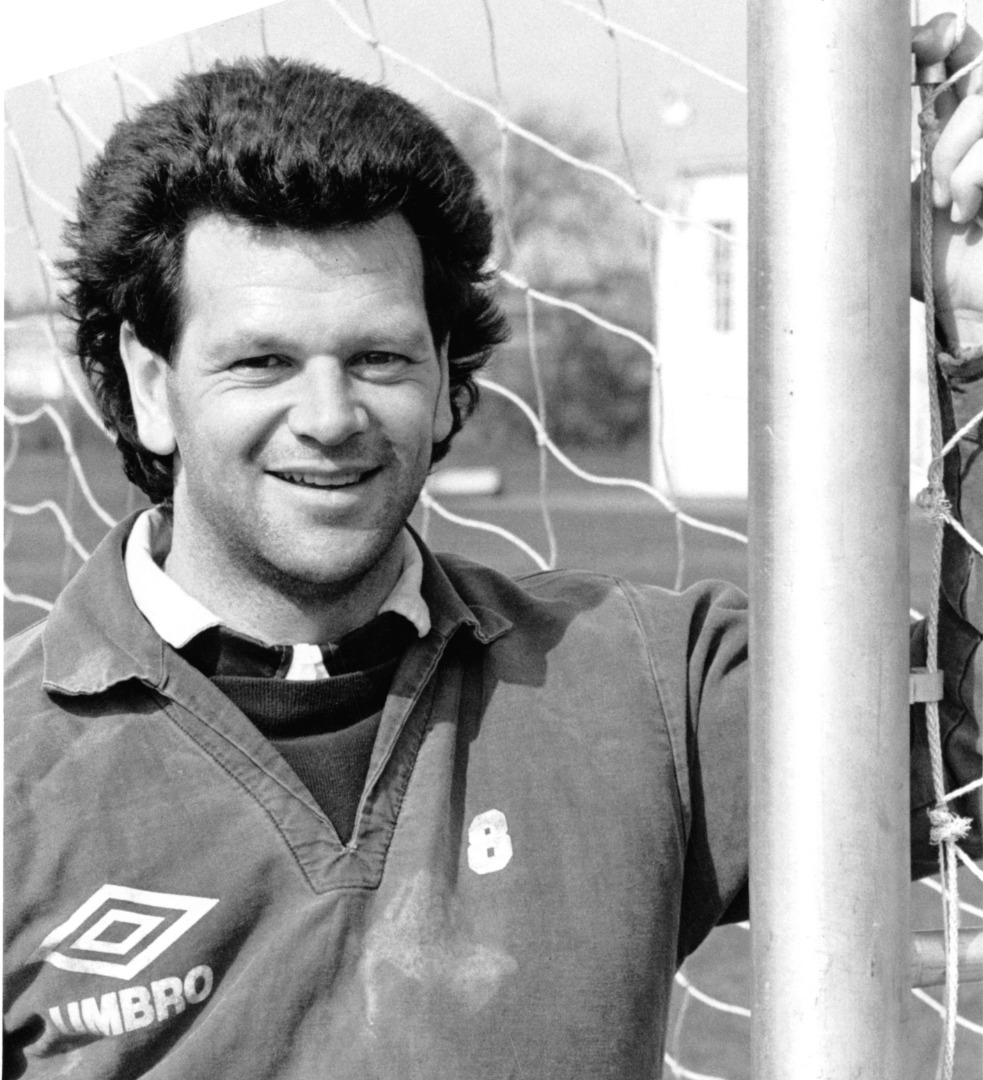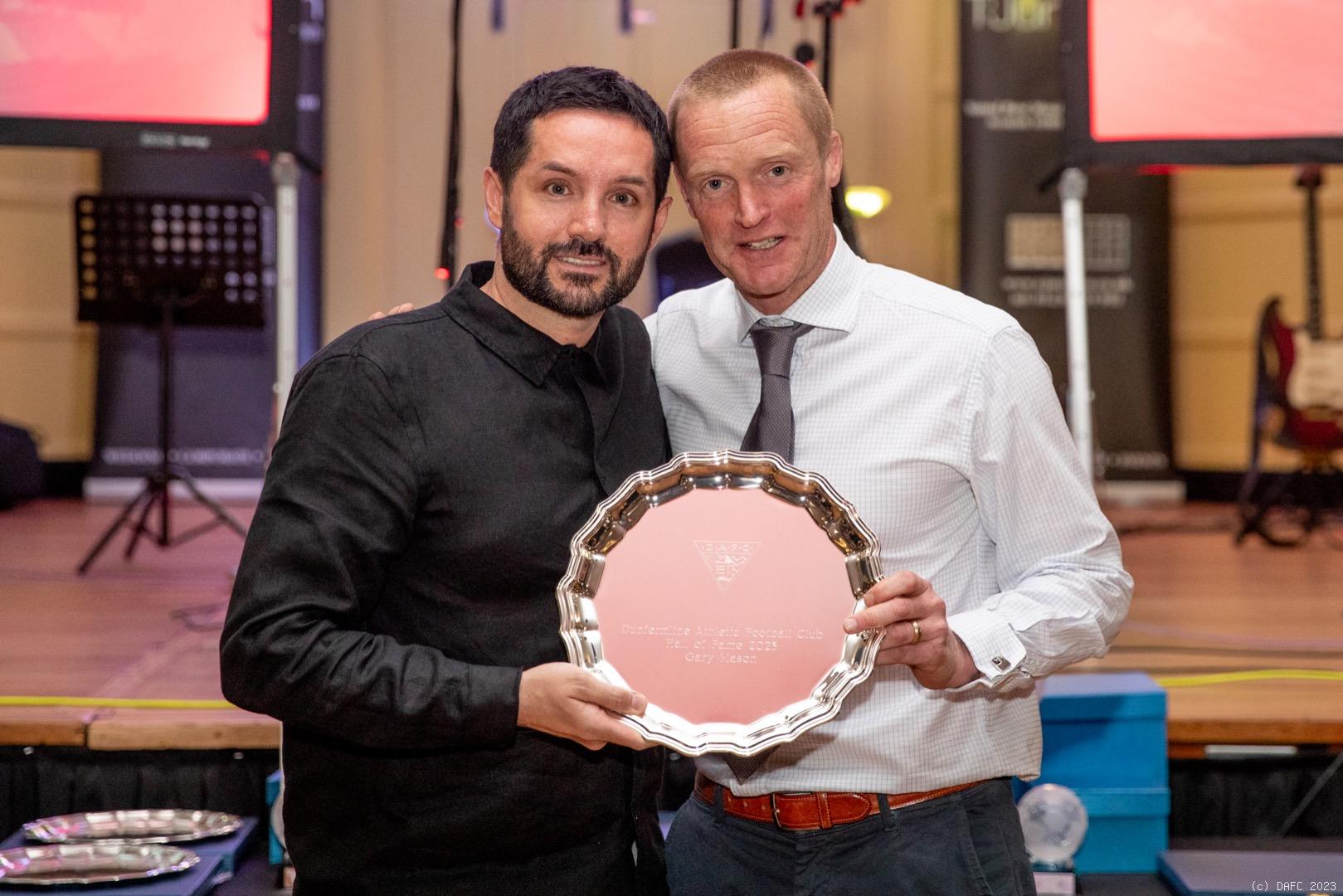News | Eleventh Hall of Fame - April 2023
Saturday, 29th Apr 2023Ross Jack and Gary Mason were inducted at the Eleventh Hall of Fame held in the Glen Pavilion, Dunfermline on Saturday 29th April 2023
ROSS JACK
Ross was born in Inverness on 21st March 1959, and as a youngster played at Ross County. By the time he was 14, Everton had shown interest in him, taking Ross on holidays to Goodison Park and weekend training sessions, before he signed a professional contract for manager Billy Bingham just before his 18th birthday. Ross made good progress and was given his Everton first team debut on 6th March 1979 in a league match against Middlesbrough.
Despite scoring on his debut, he was never given another chance. A two-month loan at Cardiff was terminated early due to injury, and instead Ross signed for Norwich City where, in season 1981/82, he was the club`s top goalscorer. In 1983 He moved to near neighbours Lincoln City for a fee of £15,000. before joining Archie Knox`s Dundee side in season 1985/86.
On 23rd October 1987 Ross was signed for Dunfermline Athletic by Jim Leishman for a transfer fee of £15,000 and Ross proceeded to enjoy the most successful period of his football career, starting with a remarkable Scottish Cup win against Rangers in February 1998. Ross combined athleticism, aerial ability and speed with a goalscorer`s instinct and in season 1988/89, scored in eight consecutive league games as Dunfermline took the First Division title.
A firm fans` favourite, Ross finished that season as Dunfermline`s top goalscorer with 18 goals. He won the B&Q Superskills Player of the Month in February 1989, was voted top player in the First Division by the SPFA, and won the Supporters Club Player of the Year award.
The following season, Ross established a great partnership with George O`Boyle, helping Dunfermline to the top of the Premier League in November 1989. By the end of the season, he had scored 21 goals, the second highest in the Premier League (second to John Robertson of Hearts), and helped the Pars to remain in the Premier League, as well as reach a Scottish League Cup semi-final for only the second time in the club`s history. As the Pars struggled in season 1990/91, Ross still managed ten goals and finished top goalscorer for the third consecutive season.

On 18th July 1991, Ross was transferred to Kilmarnock for a fee of £45,000. He had made 131starts plus 13 sub appearances for the Pars, scoring 55 goals. Ross remained with Kilmarnock for two seasons before moving briefly to Montrose as Player-Manager and then finally to Ayr United.
After that Ross ceased playing senior league football and took up a post as SFA Community Coach based at Inverness. In December 2001, Ross joined the Scottish Institute of Sport as their High Performance Football Coach. Later, and after a brief coaching spell with Ross County, Ross was appointed manager of Elgin City in 2009. After five years with Elgin, Ross went on to manage Turriff United, and then in 2019, Rothes, with whom he remains today.
Dunfermline`s success in the late 1980s was something that the club had not experienced for 20 years, and while there were many reasons for it, not least of which was Jim Leishman`s management, the club found a quality striker in Ross Jack whose energy, enthusiasm and goals was one of the biggest factors in that success.

DID YOU KNOW?
Ross established a new Everton club record by scoring on his debut for three different Everton teams - Everton Youths, Everton Reserves and Everton first team!
Ross Jack`s final game for Lincoln City was at Bradford City on 11th May 1985. Played at Valley Parade, the game was the scene of one of football worst disasters when the stadium caught fire, killing 56 people and injuring more than 200.
Ross Jack is one of only 26 players who have scored more than 50 first team goals for the Pars in the post-war period
Ross currently sits in 22nd place in Dunfermline`s all-time goalscoring list.
GARY MASON
Born in Edinburgh on 15 November 1979, Gary was a product of Hutchison Vale Boys Club who signed as a trainee for Manchester City when he was sixteen. In season 1998/99 he made his first team breakthrough and made a total of 24 appearances that season, scoring his first senior goal in a 7-1 League Cup win over Notts County on 19 August 1998. He also helped City get promoted from third tier football into the English First Division, but by the following season he had lost his place and went on loan to Hartlepool, making eight appearances, before being picked up by Dunfermline manager Jimmy Calderwood on a free transfer in December 2000.
It turned out to be a fantastic piece of business as Gary went on to become one of Dunfermline`s most regular and consistent performers under four different managers at East End Park. A hard-tackling ball winner, Gary thrived in his role as defensive midfielder, and helped the Pars to enjoy one of the best periods in the club`s history.
Among his many achievements were to help the Pars reach their highest ever Premier League place (4th), play in the Scottish Cup Final and qualify to play in Europe in 2003/04. He was part of the team that played in the 2006 League Cup Final and also that which defeated Hibernian in the 2007 Scottish Cup semi-final, unfortunately then to be unable to play in the Final that year.

At the end of that season, Gary opted to remain in the Premier League by moving to St Mirren, with whom he stayed for two years before signing for Hamilton Accies in 2009. However, in 2010 he re-joined Dunfermline and helped them win the First Division title to add yet another accolade to his name. Gary remained with the Pars during what has been their most recent season in Scotland`s top flight.
When relegation arrived at the end of a season of financial difficulties, and despite new manager Jim Jefferies pleas for him to stay, Gary decided to quit football for good. In any case, Gary had decided that `˜family comes first` and he wanted to spend time with his wife and children, and to his great credit, that`s exactly what he did, taking on a job of driving taxis and having no ongoing involvement in football.
In his quiet, unassuming way, Gary made a serious mark on Dunfermline Athletic`s fortunes during the early 2000s, and it is no surprise to find his name wherever success was achieved by the Pars during this period. Gary made a massive 330 first team appearances for Dunfermline, and he scored 15 goals.
Gary was never considered to be a great goalscorer, but he did score one or two useful goals. Notably, Gary`s 90th minute goal against Hibernian in the League Cup quarter-final in 2006 which Jim Leishman described at the time as, `It really was a fantastic goal and a memory I`ll treasure forever.`
Then there was the `˜miracle` at Tannadice`¦ in season 2004/05, with three games to go Jim Leishman had just taken over from David Hay as manager, and the club looked doomed. Leishman somehow conjured up a 5-0 win against Dundee, but the next game was much more difficult, and one that the Pars had to win to avoid relegation `“ an away match at Tannadice against Dundee United. It was a tight, tense game but in the 89th minute, Gary Mason had the energy to make a forward run and score the only goal of the game to ensure the Pars stayed in the SPL for another season.
DID YOU KNOW?
* Gary is one of a small group of Dunfermline players who have been capped for Scotland at Under 21 level. On 4 September 2001, Gary played for Scotland against Belgium.
* Among Gary`s 330 appearances for the Pars, were 236 in the Scottish Premier League. This is far and away the highest number of Premier League appearances by any player for Dunfermline, and Gary is in fact the only player to have made more than 200 SPL appearances for Dunfermline.
* Gary`s 330 first team appearances for the Pars put him 12th on the all-time list.
views: 3,090
